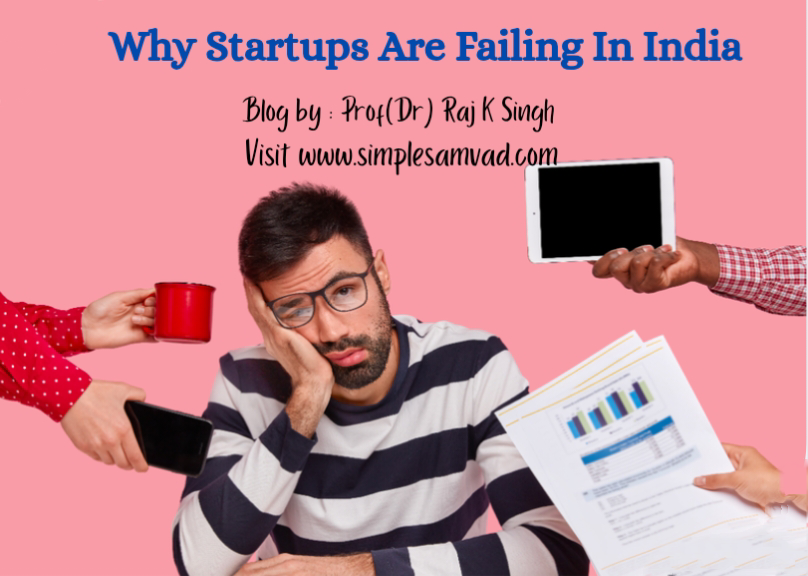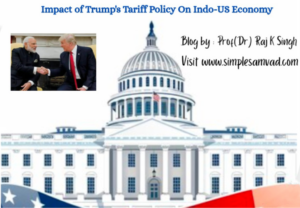Prof (Dr) Raj Kumar Singh
In the past ten years the Startup Ecosystem in India has been well developed by the Government of India and several state governments of India. The Startup Ecosystem of India needs to adopt the Triple Helix Model comprising of the close association among the Industry, Academia and Government. The result was the improvement of our ranking in the Global Innovation Index and in the Ease of Doing Business Index over a period of time.
In the todays Startups scenario India is having over 1.59 Lakhs Startups registered as per the latest report of Department for Promotion of Industry and Internal Trade (DPIIT), Government of India. India has 118 Unicorns (March 2025) and its growing very fast. The Unicorn Club of India till March 2025 has collectively raised funding of $100 Bn and is valued at more than $354 Bn. This makes India third largest and fastest growing startup ecosystem in the world. Bangaluru has emerged as the Startup Capital and IT Hub of India with an International Reputation of promoting the Startups in India and abroad.
In such a rosy condition thinking of the Startup Failure seems to be an unpleasant tone, however this is a truth. If we have to make India a “Viksit Bharat” and uplift India as world’s top economy we need to understand and analyze the entire scenario and work out for some feasible solution. As per different studies on an average over 90% Startups get failed within 5 years of their inception. The highest Startup Failure rate is 63% in the IT industry and 42% to 55% Failure rates are in Manufacturing, Transportation, Retail, Construction, Wholesale, Service, Mining, Education, Health, Agriculture, Finance and Real Estate etc. The Finance and the Real Estate industry are having the lowest startup failure rate of 42%. Behind these failure several macro economic reasons are there however in the majority of case the micro economic reasons plays a vital role in the failure of Startups in India. Although there are various reasons behind the Startup Failures however here we are going through the some of the major reasons behind the growing failure rates of Startups in India.
- Lack of Innovation & IPR Protection : The present market is the Buyers Market where the consumer are having various options. In this cut throat competitive market only those products will survive which will have a distinct USP and for this a solution oriented innovative products or services are required. Many Startups are coming in the market with a business idea however their product and services are same as of their existing competitor’s products or services. Consumer don’t just buy products or services, they buy innovative solutions. Startups should spend more time, energy and money in their R&D to bring in the market more innovative and solution oriented products and services satisfying the need and wants of the customer’s problems. Due to the lack of awareness related with the IPR startups are unable to protect their Intellectual Properties like Patent , Design Patent, Trademark , Copyright etc. resulting into their endangered innovations and wastage of money year after year due to the duplicate and counterfeit products.
- Poor Business Model and Lack of Proper Feasible Business Plan : When we have to go for the construction of any house, building or shopping complex , first we meet with an Architect so that we may get an architectural plan in order to save our space , time and cost. Like the architectural plan a startup needs a good Business Model and Feasible Business Plan for the success of their business venture. The Business Model and Plan gives a complete Road Map of how to start a business and operate it on consistent basis considering all the contingency provisions to face any unfavorable situation. Normally the Startups are having an innovative idea and required fund and they simply start it without doing the feasibility study of their business venture which resulted into failure.
- Poor Product Market Fit : Usually the Startups don’t do proper quantitative and qualitative market research before launching of their products. Usually they are having Me-Too kind of products with the slight modifications and almost no service innovation. This is resulted into such products which does not fulfill the real need of the market or address the real problems of the consumers. The startups thinks that their idea is unique however they don’t validate their ideas with their target market consumers. This is the reason many products are having low adoption rate by the consumers and ultimately the product get failed in the market.
- Poor Fund Management : Usually the Startups are more worried about the Funds for their Startups . However any how if they manage the fund they don’t know properly how to manage their fund and this lack of financial planning is resulted into the poor cash flow and working capital problems. While scale up of their venture the Startups expand their marketing operation on the basis of heavy advertising and overhead expenditure and giving goods on credit to meet the demand. The startups use their funds to early and due to this cash burn the startups comes in trouble. Since many startup manufacturing unit purchase their raw and packing materials in Cash and sell in Credit , soon they start facing the cash crunch due to the delay in payment from the market and they make heavy purchase due to the uncontrolled expansion of the market. This lack of cash flow management ultimately resulted into the shortage of cash , insufficient working capital, inability to scale operations , lack of investment in marketing expansion, delay in salary, bills, essential expenses and financial obligations . This Financial Mismanagement brings the Startups into the Debt Trap and ultimately resulted into the failure of the Startups.
- Ineffective Sales and Marketing Strategies : Improper product development , faulty pricing strategy , poor distribution and delay in supply of goods, inappropriate and very expensive promotion, inefficient marketing people, poor after sales service, poor branding exercise , poor conduct of sales people and supporting team, delay in claim settlement etc. are few of the ineffective sales and marketing factors resulting into the failure of Startups. The startups should continuously work for the retaining, regaining , new acquisition of customers and converting the non user of their products or services to their users.
- Poor Inventory Management : Startups normally face problem in the optimization of inventory. They either have a very huge inventory or very less inventory. Both the situations may either lead to liquidity problem or not fulfilling of the demand of the customers. Since the Startups generally face the problem of Economies of Scale in the beginning their per unit cost of products are already very high due to the high cost of raw material since it is purchased in small quantity as per the low production requirements in the beginning. In case of FMCG more inventory may be resulted into crossing of the expiry dates due to not following of FIFO method (First In First Out) and in case of perishable products the products may be spoiled due to not following the LIFO method (Last In First Out). Above all the liquidity issue may directly harm the Cash Flow of the firm.
- Poor Leadership and Mismanagement : It’s a proverb that “Gun Is Not Important , Man Behind The Gun Is Important”. Like wise for any startup the leadership and management style of the founder , top management and its team members are responsible for its success or failure. The leaders and the entire management team is having the vital responsibility of developing a proper corporate culture where every one should share the vision of the organization and the entire working environment should be very motivating and free from any toxicity and politics. If due to the weak , inexperienced or inefficient leader and management team this is not happening the talented employees may get demotivated since the non deserving one are promoted and patronized. This will ultimately resulted into the downfall in the overall performance of the employees and subsequently the performance of the entire organization get effected since in the promotion of any startup the decision makers and their decisions are very important in deciding of the future of the organization.
- Challenging Legal and Regulatory Environment : The Indian Legal and Regulatory environment are very complicated one specially in the emerging industry domain. Many startups are unaware of the latest regulatory norms since they are not updated with the continuously changing laws. They face issues with its compliances, licensing, taxation, environmental issues and different documentation formalities. This ultimately resulted into unnecessary delays, bottlenecks and roadblocks due to the different time consuming and costly regulatory hurdles.
- Taxation & Government Incentive Policies: There is a need of government working on the Taxation structure especially the different GST slabs. At present it seems that there is an absence of level playing field so far as the taxation structure is concerned in India. The GST slabs are same irrespective of the size of the company. The big companies are in benefit since they have the advantage of economies of scale. This creates another problem on Startups resulting into various financial burden laid on them. Likewise as per the new definition of the Micro, Small and Medium Enterprises there is a huge difference in the turnover of Micro and Medium enterprises and the major benefit of the purchase quota of MSME units in the Public Sector Undertakings are availed by the Medium enterprises due to their large size and more resources than the micro enterprises. The government should set separate quota for each of the Micro, Small and Medium enterprises respectively.
Above are few of the major reasons behind the Startups failure. If these reasons are properly concentrated and a well planned strategy is adopted than the Startup failure ratio can be minimized to a large extent.
Prof(Dr) Raj Kumar Singh
(Author is a well known Entrepreneurship Expert)



Really enjoyed reading this sir ! The way you broke down the key reasons behind startup failures was super insightful. The part about lack of innovation and market research really hit home so many startups focus on funding but miss these fundamentals.
Very rightly said Sir,In India Startups have no innovative ideas,they are working like enterpreneurs.we should think on the difference between startups and entrepreneurs.Funds arrangements are also a difficult task for startups